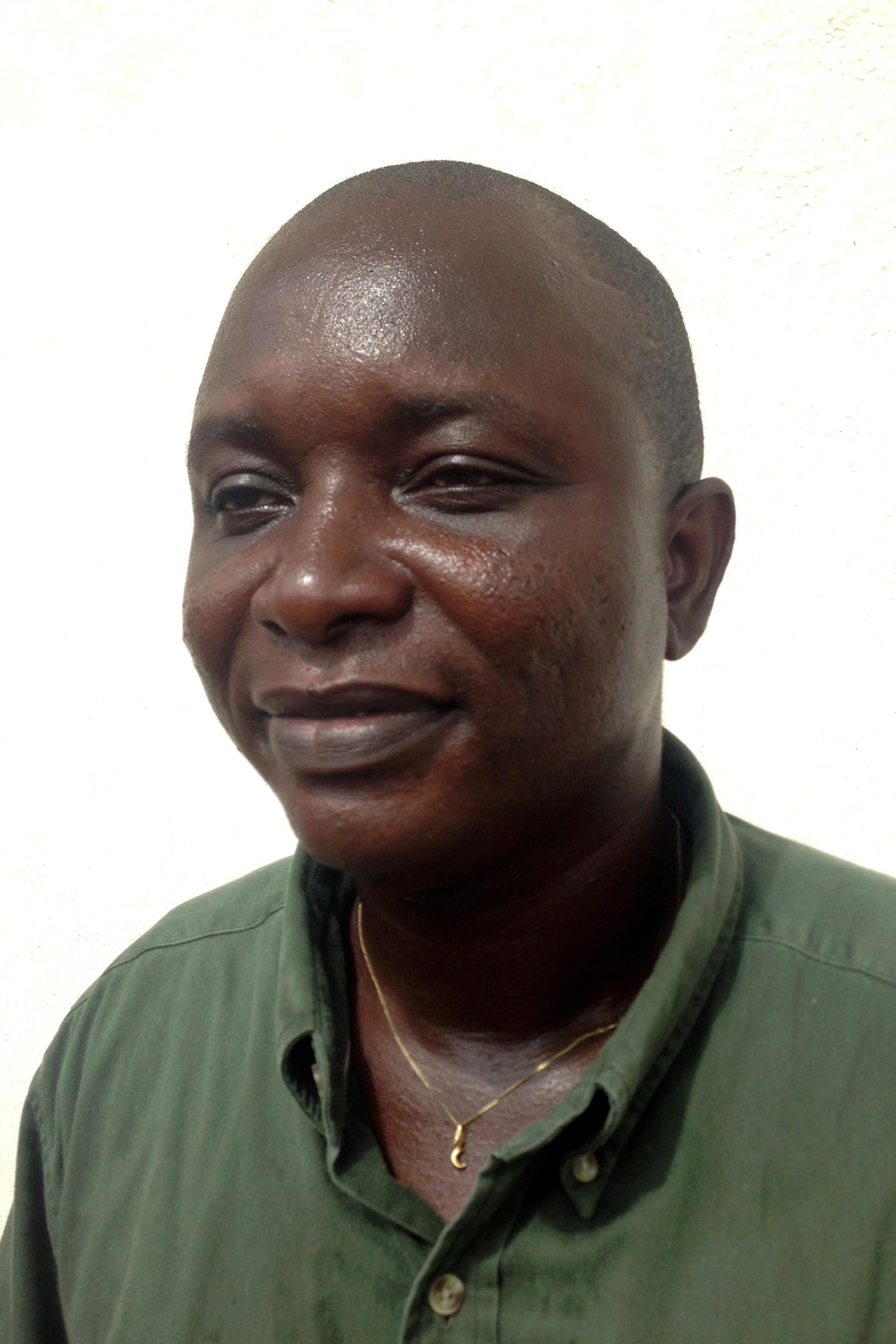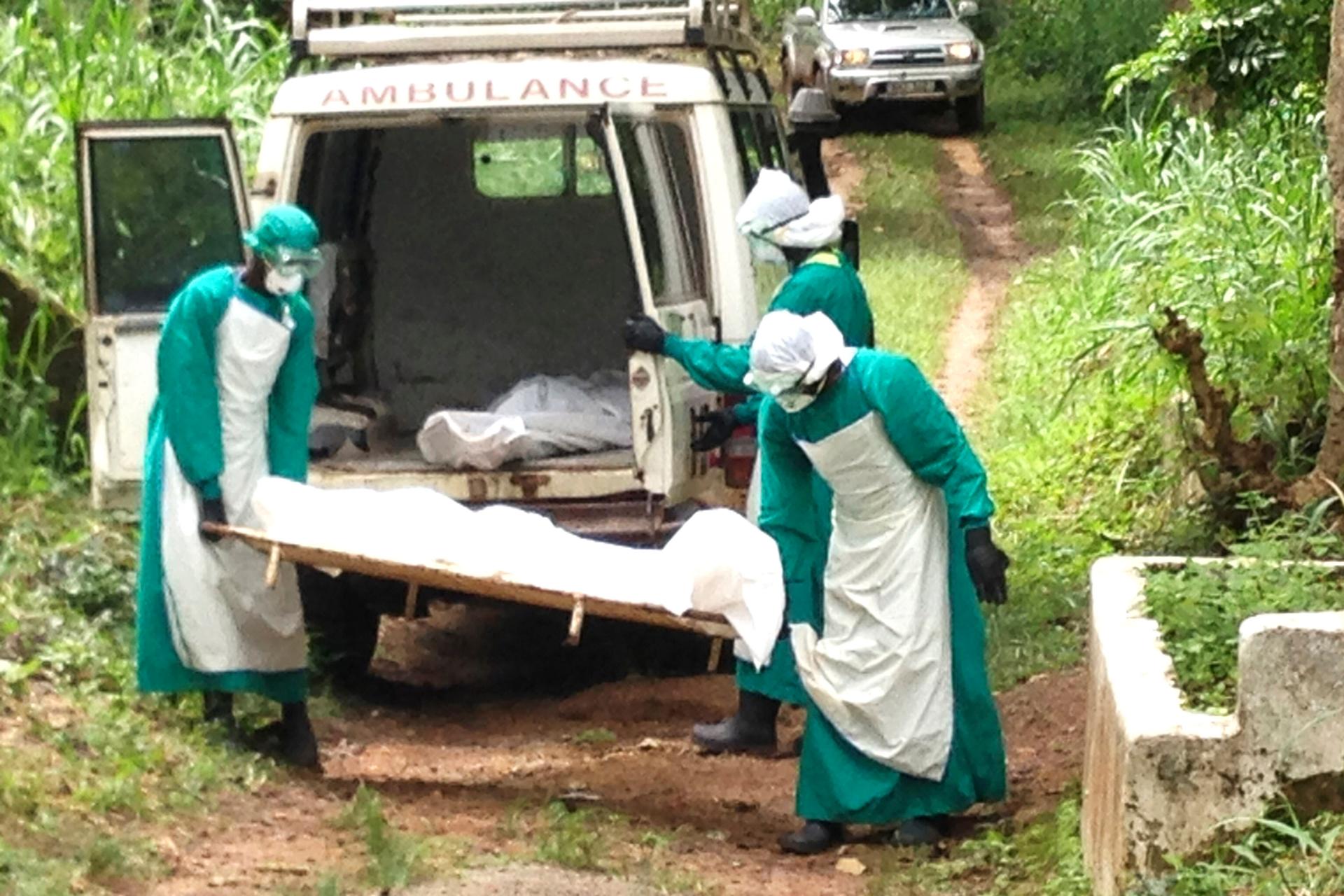Health workers carry the body of an Ebola virus victim in Kenema, Sierra Leone.
The fight against Ebola in Sierra Leone has suffered a severe blow with the death of the physician leading the fight there.
Sierra Leone is a country of six million people, but only one doctor there — 39-year-old Sheik Humarr Khan — specialized in treating hemorrhagic fevers like Ebola.
“His death leaves a very big vacuum,” says Abu Bakarr Tarawallie of the Sierra Leone Red Cross.

“What we need now is support in the form of medical experts to come to Sierra Leone to help at the district level," Tarawallie says. The country needs testing and treatment centers in all of its 14 district, but there are currently only two such centers in the whole country. That makes it very difficult for people to access help.
Almost 700 people have died since the Ebola outbreak began in March in neighboring Guinea. There is no cure for the disease and most people who contract it will die, but some people can survive with adequate nursing care and hydration.
Dr. Khan succumbed to the virus despite taking every possible precaution. Tarawallie says Khan told him before he died that he had no idea how he'd become infected. The virus is normally spread through contact with bodily fluids like blood, saliva and even sweat, all of which Khan protected against. Tarawallie says Khan’s death raises the possibility that the virus might also be transmitted through the air — a theory that lacks any concrete proof but that has occasionally been mooted in the scientific community.
There are other, more widespread issues as well. Tarrawallie says there is a big problem with denial. This is the first outbreak of the Ebola virus in Sierra Leone and many refuse to accept that it's real. And it's also hard to educate Sierra Leoneans about what steps they should take.
“The level of illiteracy is so very high that it’s difficult to reach out to people to [help them] understand what [Ebola] is and how it can be prevented,” Tarawallie says. For example, he says, Sierra Leoneans need to stop doing things like shaking hands and hugging.
With all of that in mind, Tarawallie says he's concerned for his own safety and that of every Sierra Leonean — and is asking for help. Any medical specialists interested in helping, he says, should contact the Sierra Leonean Ministry of Health and Sanitation.
The fight against Ebola in Sierra Leone has suffered a severe blow with the death of the physician leading the fight there.
Sierra Leone is a country of six million people, but only one doctor there — 39-year-old Sheik Humarr Khan — specialized in treating hemorrhagic fevers like Ebola.
“His death leaves a very big vacuum,” says Abu Bakarr Tarawallie of the Sierra Leone Red Cross.

“What we need now is support in the form of medical experts to come to Sierra Leone to help at the district level," Tarawallie says. The country needs testing and treatment centers in all of its 14 district, but there are currently only two such centers in the whole country. That makes it very difficult for people to access help.
Almost 700 people have died since the Ebola outbreak began in March in neighboring Guinea. There is no cure for the disease and most people who contract it will die, but some people can survive with adequate nursing care and hydration.
Dr. Khan succumbed to the virus despite taking every possible precaution. Tarawallie says Khan told him before he died that he had no idea how he'd become infected. The virus is normally spread through contact with bodily fluids like blood, saliva and even sweat, all of which Khan protected against. Tarawallie says Khan’s death raises the possibility that the virus might also be transmitted through the air — a theory that lacks any concrete proof but that has occasionally been mooted in the scientific community.
There are other, more widespread issues as well. Tarrawallie says there is a big problem with denial. This is the first outbreak of the Ebola virus in Sierra Leone and many refuse to accept that it's real. And it's also hard to educate Sierra Leoneans about what steps they should take.
“The level of illiteracy is so very high that it’s difficult to reach out to people to [help them] understand what [Ebola] is and how it can be prevented,” Tarawallie says. For example, he says, Sierra Leoneans need to stop doing things like shaking hands and hugging.
With all of that in mind, Tarawallie says he's concerned for his own safety and that of every Sierra Leonean — and is asking for help. Any medical specialists interested in helping, he says, should contact the Sierra Leonean Ministry of Health and Sanitation.
The story you just read is available for free because thousands of listeners and readers like you generously support our nonprofit newsroom. Every day, reporters and producers at The World are hard at work bringing you human-centered news from across the globe. But we can’t do it without you: We need your support to ensure we can continue this work for another year.
Make a gift today, and you’ll get us one step closer to our goal of raising $25,000 by June 14. We need your help now more than ever!
